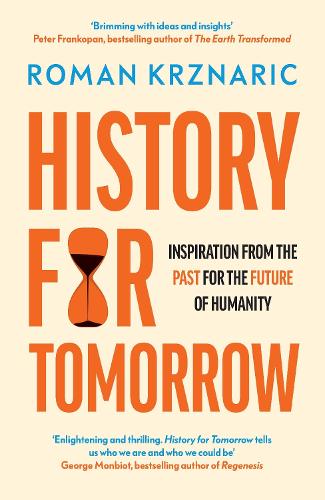
History for Tomorrow: Inspiration from the Past for the Future of Humanity
(Hardback)
Available Formats
Paperback
Published: 4th November 2025
Paperback
Published: 9th July 2024
Hardback
Published: 4th August 2024
Publishing Details
History for Tomorrow: Inspiration from the Past for the Future of Humanity
By (Author) Roman Krznaric
Ebury Publishing
W H Allen
4th August 2024
4th July 2024
United Kingdom
Classifications
General
Non Fiction
Social and political philosophy
Social and cultural history
Social forecasting, future studies
Social and cultural anthropology
109
Physical Properties
Hardback
352
Width 163mm, Height 241mm, Spine 31mm
557g
Description
One of Britain's most popular public philosophers presents unexpected, hopeful lessons from human history that could help us to overcome the global challenges facing humanity in the 21st century 'Enlightening and thrilling. History for Tomorrow tells us who we are and who we could be' - George Monbiot, bestselling author of Regenesis and How Did We Get Into This Mess What can humankind's rich history of radical revolts teach us about the power of disobedience to change climate policy What inspiration could we take from seventeenth century Japan to create a regenerative economy today How might the history of financial capitalism help us understand what it takes to bring AI under control Here, leading social philosopher Roman Krznaric unearths fascinating insights and inspiration from the last 1000 years of world history that could help us confront the most urgent challenges facing humanity in the twenty-first century. From bridging the inequality gap and keeping AI under control, to reviving our faith in democracy and avoiding ecological collapse, History for Tomorrow shows that history is not simply a means of understanding the past but a way of reimagining our relationship with the future. Krznaric shows how, time and again, societies have risen up, often against the odds, to tackle challenges and overcome crises. History can offer a vision for radical hope that could turn out to be our most vital tool for surviving and thriving in the turbulent decades ahead.
Reviews
Enlightening and thrilling. History for Tomorrow tells us who we are and who we could be. * George Monbiot, bestselling author of Regenesis and How Did We Get Into This Mess *
History for Tomorrow simply fizzes with ideas, revealing with startling clarity what human beings have done, and can do, when they organise, cooperate and help each other. Compassionate, insightful and hopeful. * Michael Wood, historian, broadcaster and Professor of Public History, University of Manchester *
This joyful and informative book opens our minds and souls, helping us to see with new eyes and to believe in ourselves as a species, so we can meet our predicament with a belief that change really is possible. * Gail Bradbrook, Co-Founder, Extinction Rebellion *
Essential thinking about the big issues facing the world today * Brian Eno *
An amazing feat of synthesis and imagination, weaving together many different strands of world history to make a pattern that can guide us in the present toward a vibrant future. Krznarics book is immensely suggestive of positive actions that have track records; theyve worked before, and in new formulations they can work again. Wise and practical inspiration * Kim Stanley Robinson, author of THE MINISTRY FOR THE FUTURE *
Author Bio
Roman Krznaric is a social philosopher whose books, including The Good Ancestor, Empathy, The Wonderbox and How to Find Fulfilling Work, have been published in more than twenty-five languages. He is Senior Research Fellow at Oxford University's Centre for Eudaimonia and Human Flourishing and founder of the world's first Empathy Museum. Roman has been named by the Observer as one of Britain's leading popular philosophers. His TED talk 'How to be a good ancestor' has been viewed over 1.5 million times. His writings have been widely influential amongst political and ecological campaigners, education reformers, social entrepreneurs and designers. He is an acclaimed public speaker, and his talks and workshops have taken him from a London prison to Google's headquarters in California. After growing up in Sydney and Hong Kong, he studied at the universities of Oxford, London and Essex, where he gained his PhD in political sociology. Roman has worked as an academic, a gardener and a human rights campaigner. He is also a fanatical real tennis player and has a passion for making furniture.
